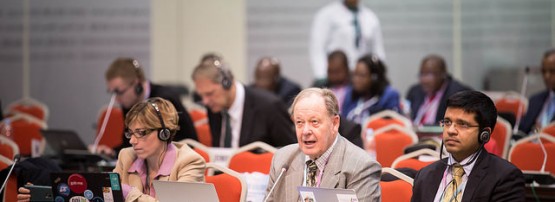
After a substantial amount of work in the Ad Hoc Group on Internet Related Matters, the results were finally passed up through the Working Group of Plenary session and are now destined for their first reading in the Plenary of the Conference tomorrow.
In reporting on the outcomes of his discussions, Ad Hoc Chair Fabio Bigi of Italy noted that his group had conducted over 50 hours of session negotiations (not to mention what must be a considerable amount of corridor discussions). The Group considered revisions on four existing Resolutions and four draft proposed new resolutions:
Existing Resolutions
- Resolution 101: Internet Protocol-based networks
- Resolution 102: ITU’s role with regard to international public policy issues pertaining to the Internet and the management of Internet resources, including domain names and addresses
- Resolution 133: Role of administrations of Member States in the management of internationalized (multilingual) domain names
- Resolution 180: Facilitating the transition from IPv4 to IPv6
Proposed resolutions
- Proposed new resolution “Voluntary guidelines and best practices for designing, installing and operating Internet exchange points”
- Proposed new resolution “Bridging the international connectivity divide”
- Proposed new resolution “Preserving and promoting multilingualism on the Internet for an integrating and inclusive information society”
- Proposed new resolution “ITU’s role in realizing Secure Information Society”
There were plenty of controversial and contentious discussions here at Plenipotentiary 2014; of course the Internet-related proposals have gained the most interest and focus in the press and blogosphere.
The outcomes of the Resolution revisions are acceptable, in that they fall short of the likelihood of representing a significant backward step for most points of view. Some would have liked to see more strident language in some resolutions (130 for example), while others will be satisfied that the texts don’t significantly disrupt the status quo or change the mandate of the ITU.
The Chair of the Ad Hoc reported to the WG-PL Chair that India’s proposal on “ITUs role in realizing a Secure Information Society” had failed to reach consensus and that there were some administrations that shared India’s concerns, but that others felt that these issues are best addressed in other fora. India made a statement about the proposal saying “There are a number of existing Internet related Resolutions, but they only touch the issue in general and, therefore, without focus concrete action does not happen. Our Resolution with a view to deal with the issues in a focused manner.”
A delegate for Iran also made a statement bringing everybody’s attention to the ongoing IANA Transition discussions and urging administrations to participate in the multistakeholder process.
All the existing Internet related proposals passed through the WG-PL. None of the new resolutions progressed. However, two related new resolutions did get progressed today: “Creating an enabling environment for the deployment and use of information and communication technology applications” and “Connect 2020 Agenda for global telecommunication/information and communication technology development”, which were not part of the Ad Hoc on Internet Related Matters, but are Internet related.
In other news for the day, the discussion about the Working Definition of ICT fizzled out with administrations coming to the conclusion that they should not discuss the working definition, should not propose further work be done on it, and therefore not propose that it should be retrospectively applied to all existing ITU resolutions. The definition, which was delivered by a D-Sector study group, is “Technologies and equipment that handle (e.g. access, create, collect, store, transmit, receive, disseminate) information and communication”. If the definition was to change it would be applied as an editorial change to existing documents. As these resolutions have been negotiated without a specific understanding of what was meant by the term, it had the potential to alter the intended meaning of those resolutions that had used the acronym Telecommunications/ICT. There are a lot of them. Potentially even more dangerous was the suggestion that if an agreement could not be reached here at Plenipot, then the ITU Council members should come to an agreement and then apply that to existing documents before reporting back to Plenipot 2018.
Meanwhile the budget committee reported that there will be a little change from the CHF 3.6 million budget for the conference as there should be around CHF 16,000 left in the kitty after the conference.
The views expressed by the authors of this blog are their own and do not necessarily reflect the views of APNIC. Please note a Code of Conduct applies to this blog.
